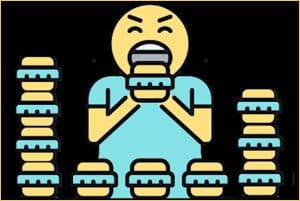
VeryWellHealth.com started off the current year with an extremely detailed overview of the current state of treatment for Binge Eating Disorder (BED), including a perspective on which approaches are likely to be most effective.
(Bear in mind that simple binge eating does not include behaviors intended to cancel out the inappropriate consumption. If the person pursues a counteractive strategy like vomiting or doing exhaustive exercise, that’s a different disorder.)
Showing thorough professionalism by resisting any temptation toward sensationalism, author Heather Jones did not position the most shocking aspect right up front, but left it for the end:
[E]ating disorder treatment can range from $1,500 to $2,000 a day, depending on whether it’s outpatient or inpatient.
Fortunately, there are more affordable self-help options, to be discussed. Altogether, we are looking at a wide range of possibilities, including psychotherapy, lifestyle changes, and medication. Because eating disorders encompass so many complexities, it is recommended that a person obtain the most specialized help available.
Psychotherapy is the most common treatment, possibly because guilt is one of the most common symptoms driving people to seek help. Nobody wants to live in a perpetual state of self-disgust, and even if psychotherapy cannot immediately end the behavior, the exploration of interior states (such as the tendency toward guilt) will certainly be of overall benefit to the patient.
Branching out
As things stand, a less Freudian method — one that does not delve into the murky past — is widely regarded as the first resort. That is cognitive behavioral therapy (CBT), which Jones explains as “a type of psychotherapy that focuses on disordered or negative thinking patterns.”
Not surprisingly, the description is reminiscent of the expression “stinking thinking,” which originated with another widely used and often effective program, Alcoholics Anonymous. In addition to identifying such aberrations, CBT helps to change the wonky thoughts into positive and productive ones.
Then, there is CBT-E, or Enhanced CBT, which narrows down the general usefulness of the technique to a state of maximal helpfulness for eating disorders. Jones says that a therapist “can tailor the treatment to the specific eating disorder that a person has, as well as the unique factors in a person’s life that are contributing to the disorder.”
Here, as in so many aspects of life, the personal touch is very effective:
In one study, CBT-E had a success rate of about 66% in treating multiple eating disorders. A 2014 study showed that participants with binge eating disorder showed improvement during short-term CBT treatment and continued to improve or were stable during the four years after treatment.
It gets even better, with the added benefit that although CBT-E was formulated for adults, it is very amenable to adaptation for use with younger people. For them, as well as for other generations, there is even more good news, in the form of another variation called CBTgsh, where the three small initials stand for guided self-help.
Furthermore, the author notes that “mental health professionals can provide it even if they do not specialize in eating disorders.” It also comes with a caveat:
[R]esearchers are still unsure about the effectiveness of CBTgsh. Older studies suggested that participants with binge eating disorder had positive results from treatment with CBTgsh and that it may be beneficial for some people.
Still, we can’t have everything, and what we do have is quite a lot.
(To be continued…)
Your responses and feedback are welcome!
Source: “What is the Best Binge Eating Disorder Treatment Approach?,” VeryWellHealth.com, 01/10/24
Image by Eric Van Buskirk/ATTRIBUTION-SHAREALIKE 2.0 GENERIC

 FAQs and Media Requests:
FAQs and Media Requests: 











